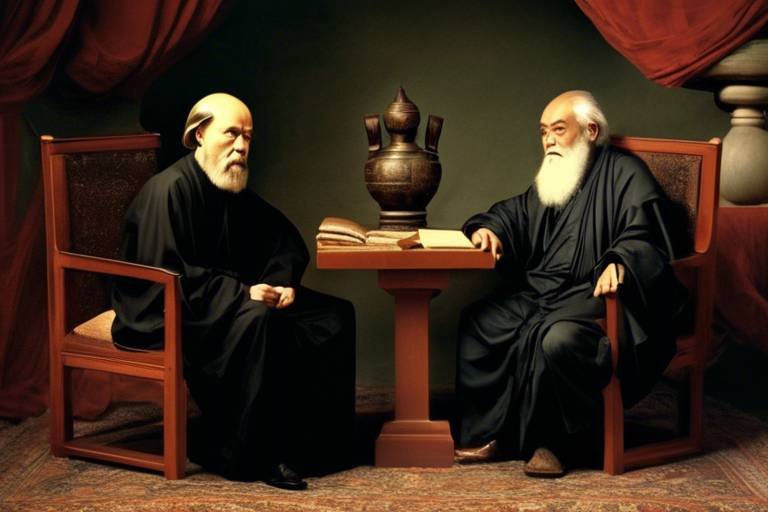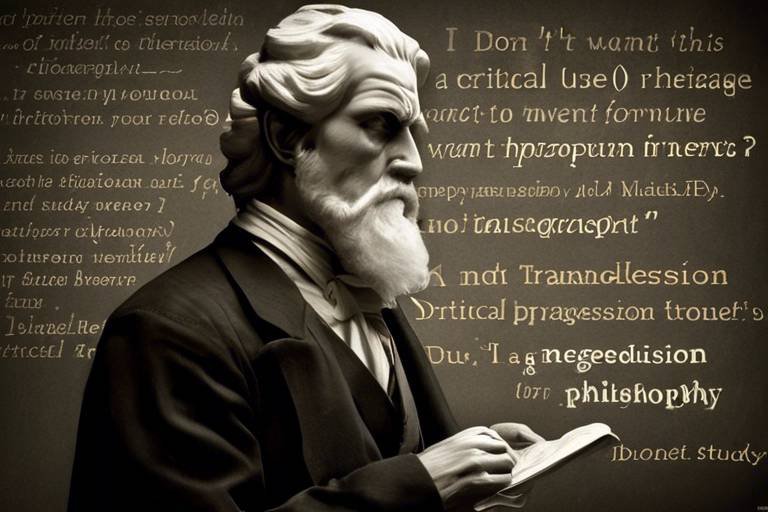The Paradox of Existence - A Philosophical Investigation
Existence is one of those concepts that seems deceptively simple on the surface but reveals a labyrinth of complexities upon deeper examination. It’s like peeling an onion; each layer uncovers more questions than answers. What does it mean to exist? Are we merely biological machines, or is there something more profound at play? This article aims to explore the intricacies of existence, diving into various philosophical perspectives that have shaped human understanding and experience. From the ancient thinkers who first pondered these questions to modern existentialists grappling with the absurdity of life, the journey through the paradox of existence is both enlightening and perplexing.
To grasp the essence of existence, we must first ask ourselves: what does it truly mean to exist? Philosophers have long debated this question, and their interpretations vary widely. For some, existence is tied to physical presence—if you can touch it, see it, or measure it, it exists. But others argue that existence transcends the tangible; it encompasses thoughts, emotions, and experiences that cannot be quantified. This leads us to fundamental questions about being and reality: Are we simply a collection of atoms, or is there a greater purpose behind our existence? The nature of existence challenges us to confront our beliefs and assumptions, urging us to seek deeper understanding.
Throughout history, various philosophical traditions have approached the paradox of existence from different angles. Ancient Greek philosophers like Plato and Aristotle laid the groundwork for Western thought, exploring ideas of being and essence. In contrast, Eastern philosophies, such as Buddhism and Taoism, offer radically different interpretations that emphasize impermanence and interconnectedness. Understanding these historical perspectives not only enriches our knowledge but also highlights the diverse ways humans have grappled with the concept of existence.
Eastern philosophical traditions often present a holistic view of existence, where everything is interconnected. For instance, in Buddhism, existence is seen as a cycle of birth, suffering, and rebirth, known as samsara. This perspective emphasizes the transient nature of life and the importance of mindfulness in understanding reality. Similarly, Taoism perceives existence as a harmonious flow of energy, where the balance between opposites is crucial. Both traditions challenge the Western notion of individualism, suggesting that our existence is intrinsically linked to the world around us.
Zen Buddhism takes a unique approach to existence, focusing on mindfulness and the present moment. It teaches that by fully engaging with the here and now, we can transcend the illusions of self and discover a deeper understanding of reality. Zen practitioners often use meditation to cultivate awareness, allowing them to experience existence without the distractions of thought and perception. This practice reveals the beauty in the mundane and encourages a profound appreciation for the fleeting nature of life.
Taoism, on the other hand, emphasizes living in harmony with the Tao, or the natural way of the universe. This philosophy suggests that existence is not a linear journey but a dynamic interplay of energies. By aligning ourselves with the Tao, we can navigate life's complexities with grace and ease. The Taoist view encourages us to embrace the paradox of existence, recognizing that life is a dance between opposites—light and dark, joy and sorrow, existence and non-existence.
In the Western tradition, thinkers like Descartes, Kant, and Nietzsche have also grappled with the paradox of existence. Descartes famously declared, "I think, therefore I am," highlighting the role of consciousness in affirming one's existence. Existentialists, such as Sartre and Camus, delve even deeper, confronting the absurdity of life and advocating for personal meaning-making in a seemingly indifferent universe. Their insights challenge us to confront our own beliefs about existence and to find purpose in a world that often feels chaotic.
Consciousness plays a pivotal role in shaping our understanding of existence. It’s through our awareness that we interpret reality and navigate our experiences. The relationship between consciousness and existence raises important questions: Is consciousness a byproduct of existence, or is it fundamental to it? Phenomenology, a philosophical approach that emphasizes subjective experience, argues that our understanding of existence is rooted in our first-person perspective. This perspective invites us to consider how our unique experiences shape our reality and influence our beliefs about being.
Phenomenology, founded by thinkers like Edmund Husserl, encourages us to examine our lived experiences without preconceived notions. By focusing on the essence of our experiences, we can gain insights into the nature of existence itself. This approach reminds us that existence is not merely an abstract concept; it is intimately connected to our daily lives and perceptions. Through phenomenological inquiry, we can uncover the layers of meaning embedded in our existence and appreciate the richness of human experience.
Existentialist thinkers confront the absurdity of existence head-on. They argue that life lacks inherent meaning, and it is up to each individual to create their own purpose. This perspective can be daunting, but it also empowers us to take control of our narratives. By acknowledging the absurd, we can embrace our freedom and responsibility to shape our lives according to our values and desires. The existentialist challenge invites us to reflect on our existence and consider how we can find meaning amid chaos.
The implications of existence extend far beyond philosophical discourse; they permeate our ethical frameworks, human relationships, and societal structures. Our understanding of existence influences how we treat others, make decisions, and construct our beliefs. For instance, if we view existence as interconnected, we may feel a greater sense of responsibility toward our environment and fellow beings. Conversely, an individualistic perspective might lead to a more self-centered approach to life.
Different philosophical views on existence shape our ethical frameworks and moral responsibilities within society. For example, if we acknowledge the interconnectedness of all beings, we may prioritize compassion and empathy in our actions. Conversely, a materialistic view of existence might promote competition and self-interest. By examining these ethical considerations, we can better understand how our beliefs about existence influence our choices and interactions with others.
Ultimately, the human quest for meaning is a central theme in the discourse on existence. Throughout history, individuals and cultures have grappled with the question of what gives life significance. This search for meaning often leads to profound personal and collective narratives that shape our identities and values. Whether through religion, art, or philosophy, the pursuit of meaning is a testament to our resilience and capacity for introspection.
- What is the paradox of existence? The paradox of existence refers to the complex and often contradictory nature of being, raising questions about the meaning and purpose of life.
- How do Eastern philosophies view existence? Eastern philosophies often emphasize interconnectedness and impermanence, viewing existence as a dynamic interplay of energies.
- What role does consciousness play in understanding existence? Consciousness shapes our perceptions and interpretations of reality, influencing how we understand our existence.
- How does existentialism address the meaning of life? Existentialism posits that life lacks inherent meaning, encouraging individuals to create their own purpose.
- Why is the search for meaning important? The search for meaning shapes our identities, values, and ethical frameworks, influencing our actions and relationships.

The Nature of Existence
The concept of existence is as profound as it is perplexing. What does it mean to exist? Is existence merely a state of being, or is it something deeper, intertwined with our consciousness and reality? Philosophers have long grappled with these questions, attempting to peel back the layers of what it means to be. At its core, existence raises fundamental questions about being, reality, and our place within it. These inquiries often lead us down a rabbit hole of metaphysical speculation, where we find ourselves pondering the very fabric of the universe.
To understand the nature of existence, we must first consider how it is perceived through various philosophical lenses. From the ancient Greeks, who posited that existence is tied to the essence of things, to modern existentialists who argue that existence precedes essence, the interpretations are as diverse as they are illuminating. For instance, Plato's theory of forms suggests that the material world is but a shadow of a higher reality, while existentialist thinkers like Jean-Paul Sartre assert that individuals must create their own essence through actions and choices. This tension between objective reality and subjective experience is a central theme in the philosophical discourse on existence.
Moreover, the nature of existence is not just an abstract concept; it has real implications for how we live our lives. When we contemplate our existence, we often find ourselves questioning our purpose and the meaning behind our actions. This leads to a deeper exploration of our relationships with others, as well as our responsibilities to the world around us. The existentialist view, for example, encourages individuals to embrace the absurdity of existence and to find personal meaning in a universe that often seems indifferent. In contrast, more traditional philosophical views may advocate for a sense of duty or adherence to a moral framework that transcends individual experience.
Ultimately, the nature of existence invites us to engage in a continuous dialogue with ourselves and the world. It challenges us to confront our beliefs, question our assumptions, and seek understanding in a landscape filled with contradictions. As we navigate through this intricate web of thought, we may find that the pursuit of understanding existence is as important as any conclusions we reach. After all, isn’t the journey of exploration itself a vital part of what it means to exist?
- What is the definition of existence? Existence refers to the state of being, encompassing everything that is real or can be perceived.
- Why is the nature of existence important? Understanding existence helps us navigate our lives, shaping our beliefs, actions, and relationships.
- How do different philosophies interpret existence? Various philosophies, like existentialism and phenomenology, offer distinct perspectives on existence, focusing on individuality, consciousness, and meaning.
- Can existence be defined objectively? While some philosophies argue for an objective understanding, others suggest that existence is inherently subjective and shaped by personal experiences.

Historical Perspectives
The exploration of existence is not a modern endeavor; it is a quest that has captivated thinkers across cultures and epochs. From the ancient philosophers of Greece to contemporary existentialists, the paradox of existence has been a central theme in philosophical discourse. Each tradition brings its own lens through which to examine the complexities of being, and this section will highlight some of the most significant contributions to our understanding of existence throughout history.
In ancient times, philosophers such as Plato and Aristotle laid the groundwork for Western thought. Plato, in his theory of Forms, suggested that the material world is merely a shadow of a higher reality, a realm of perfect ideals. He posited that true existence lies beyond our sensory experiences, inviting us to question the nature of reality itself. Aristotle, on the other hand, focused on the tangible world, emphasizing empirical observation and categorization. His approach to existence was more grounded, yet he still grappled with the essence of being, introducing concepts such as substance and essence that continue to influence philosophical inquiry today.
As we move through history, the medieval period brought about a fusion of philosophy and theology, with thinkers like St. Augustine and St. Thomas Aquinas reflecting on existence in the context of divine creation. Augustine's introspective approach emphasized the inner experience of existence, while Aquinas sought to reconcile faith with reason, arguing that existence itself is a reflection of God's nature. This period marked a significant shift, where the divine purpose became intertwined with human existence, leading to rich discussions on morality and the nature of the soul.
Fast forward to the Renaissance and the Enlightenment, where a renewed focus on humanism and reason sparked revolutionary ideas. Thinkers like Descartes famously declared, “I think, therefore I am,” emphasizing the role of consciousness in affirming existence. This assertion not only highlighted the importance of the self but also laid the foundation for modern philosophy. The Enlightenment further propelled discussions on individual rights and the nature of existence, with philosophers like Hume and Kant challenging the established norms and pushing the boundaries of human understanding.
The 19th century ushered in a wave of existential thought, with philosophers such as Søren Kierkegaard and Friedrich Nietzsche confronting the absurdity and meaninglessness of existence. Kierkegaard emphasized the importance of personal choice and commitment in a world devoid of inherent meaning, while Nietzsche provocatively declared the death of God, challenging humanity to create its own values and purpose. Their works ignited a firestorm of debate, influencing not only philosophy but also literature, psychology, and the arts.
In the 20th century, existentialism flourished with figures like Jean-Paul Sartre and Simone de Beauvoir. Sartre's assertion that “existence precedes essence” underscored the idea that individuals are not defined by any predetermined nature but must forge their own paths. This radical freedom came with the burden of responsibility, as individuals grappled with the weight of their choices in an indifferent universe. De Beauvoir expanded these ideas to explore the existence of women in a patriarchal society, advocating for liberation and equality through personal agency.
Throughout history, the paradox of existence has prompted profound questions that resonate to this day. Each philosophical tradition has contributed to a rich tapestry of thought, enabling us to reflect on our existence, our purpose, and the nature of reality itself. As we continue to navigate these intricate ideas, it becomes clear that understanding existence is not merely an academic pursuit but a deeply personal journey that shapes our lives, relationships, and societal structures.

Eastern Philosophies
Eastern philosophies offer a rich tapestry of thought that profoundly examines the nature of existence. At the heart of these traditions lies a deep understanding of the interconnectedness of all things and the transient nature of life. Think about it: how often do we get caught up in the hustle and bustle, forgetting that everything around us is in a constant state of flux? This is where philosophies like Buddhism and Taoism shine, inviting us to pause and reflect on our place within the universe.
Buddhism, for instance, teaches us about impermanence (anicca). This concept suggests that everything we experience is temporary, from our emotions to our very existence. Imagine standing by a river, watching the water flow. Just as the water is never the same from one moment to the next, so too is our existence. This realization can be both liberating and daunting. It challenges us to embrace the present moment while also acknowledging that clinging to anything is futile. In this light, existence is not just a state of being but a dynamic process that invites us to engage with life fully.
Taoism, on the other hand, offers a different yet complementary perspective. It presents existence as a harmonious flow of energy, known as the Tao. The Tao is not just a path but the very essence of everything that exists. Think of it as the ultimate rhythm of the universe, where every action and reaction is interconnected. Taoists believe that by aligning ourselves with the Tao, we can achieve a state of balance and peace. This philosophy emphasizes the importance of wu wei, or effortless action, which encourages us to live in accordance with the natural flow of life rather than against it.
In Zen Buddhism, the focus narrows even further, honing in on the practice of mindfulness. Zen teaches that by being fully present, we can experience the richness of existence without the distractions of the past or future. It's like tuning into a radio station; when you're on the right frequency, everything becomes clear. This practice invites us to observe our thoughts and feelings without judgment, allowing us to understand the nature of our reality more profoundly. Through meditation and mindfulness, Zen practitioners explore the paradox of existence, often arriving at the realization that the self is an illusion, and true understanding comes from experiencing life as it unfolds.
To summarize, Eastern philosophies provide a compelling exploration of existence that encourages us to reflect on our relationship with the world. They invite us to embrace the impermanent nature of life, align ourselves with the natural flow of the universe, and cultivate mindfulness in our daily experiences. This journey is not just about understanding existence but about living it fully and authentically.
- What is the main focus of Eastern philosophies? Eastern philosophies often emphasize the interconnectedness of all things and the transient nature of existence.
- How does Buddhism view existence? Buddhism teaches that existence is impermanent and encourages embracing the present moment.
- What is the Tao in Taoism? The Tao represents the natural flow of the universe and emphasizes living in harmony with it.
- What role does mindfulness play in Zen Buddhism? Mindfulness in Zen Buddhism helps individuals fully experience life and understand the nature of reality.

Zen Buddhism and Existence
Zen Buddhism offers a distinctive lens through which to view the concept of existence, emphasizing the importance of mindfulness and the transient nature of life. At its core, Zen teaches that existence is not a static state but rather a dynamic interplay of moments, where each experience is fleeting and interconnected. Imagine life as a flowing river; it continuously changes, and no two moments are ever the same. This perspective invites us to embrace the present and recognize that clinging to the past or anxiously anticipating the future can hinder our understanding of reality.
One of the fundamental teachings of Zen is that our perception shapes our reality. The practice of meditation, or zazen, is central to Zen Buddhism, allowing practitioners to cultivate awareness and observe their thoughts without attachment. Through this process, individuals learn to see beyond the illusions created by their minds, unveiling the true nature of existence. It's like peeling an onion; each layer removed brings you closer to the essence of what is real. This realization fosters a sense of peace and acceptance, enabling individuals to navigate the complexities of life with greater ease.
Moreover, Zen Buddhism emphasizes interconnectedness, reminding us that all beings are part of a larger whole. This interconnectedness challenges the notion of individualism that often dominates Western thought. In Zen, the self is not seen as a separate entity but as a part of the vast tapestry of existence. This perspective encourages compassion and empathy, as recognizing our shared existence can lead to deeper connections with others. As the saying goes, "When you realize the interconnectedness of all things, you can no longer harm another without harming yourself." This profound understanding of existence shapes how we relate to others and the world around us.
Zen teachings also highlight the concept of impermanence. Everything in life is subject to change, and this impermanence is not something to fear but rather to embrace. By accepting that all things are temporary, we can cultivate a sense of gratitude for each moment. This attitude can transform our experience of existence, allowing us to appreciate the beauty in the fleeting nature of life. In Zen, the act of simply being present and aware is seen as a profound way to engage with existence. It’s about savoring the taste of a single drop of rain or the gentle rustle of leaves in the wind—these moments, though brief, are rich with meaning.
In summary, Zen Buddhism invites us to explore existence through mindfulness, interconnectedness, and acceptance of impermanence. By practicing these principles, we can deepen our understanding of reality and cultivate a more harmonious relationship with ourselves and the world. The paradox of existence, when viewed through the lens of Zen, becomes less of a riddle to solve and more of a journey to experience fully. So, the next time you find yourself caught up in the chaos of life, take a moment to breathe, observe, and appreciate the beauty of existence as it unfolds.
- What is the main focus of Zen Buddhism?
Zen Buddhism primarily focuses on meditation and mindfulness, encouraging practitioners to experience the present moment fully. - How does Zen Buddhism view the concept of self?
In Zen, the self is seen as interconnected with all beings, challenging the notion of individualism often found in Western philosophies. - What role does impermanence play in Zen teachings?
Impermanence is a central concept in Zen, teaching that all things are temporary and encouraging appreciation for each moment.

Taoist Views on Existence
Taoism, a profound and ancient philosophy, offers a unique lens through which to view existence. At its core, Taoism teaches that existence is not a static state but rather a dynamic flow, akin to a river that continuously shapes its banks. The central concept of the Tao, often translated as "the Way," embodies this fluidity and emphasizes living in harmony with the natural world. In Taoist thought, existence is intertwined with the cosmos, where every being is part of a larger, interconnected web of life. This perspective invites us to consider how our individual lives are not isolated but rather expressions of a greater whole.
One of the most striking aspects of Taoist philosophy is the idea of yin and yang, representing the balance of opposites. Just like day and night, light and dark, existence is a dance of dualities. Rather than viewing these opposites as conflicting forces, Taoism encourages us to see them as complementary. This balance is essential for understanding our place in the universe. When we embrace both sides of existence, we gain a deeper appreciation for the complexities and contradictions that come with being alive. It's a reminder that joy and sorrow, success and failure, are all part of the same tapestry.
Furthermore, Taoism teaches the principle of wu wei, or "non-action." This doesn't imply passivity; rather, it suggests a form of effortless action that aligns with the natural flow of the universe. Imagine a skilled swimmer who moves through water without forcing their strokes. They adapt to the currents, allowing the water to guide them. In this way, Taoism encourages us to navigate existence with grace and ease, trusting that by aligning ourselves with the natural order, we can find fulfillment and peace.
Additionally, the Taoist view of existence emphasizes impermanence. Everything is in a constant state of change, and nothing is truly permanent. This notion can be both daunting and liberating. On one hand, it reminds us of the fleeting nature of life, urging us to cherish each moment. On the other hand, it frees us from the burden of attachment, allowing us to embrace change as a natural part of existence. In Taoist practice, this understanding can lead to a profound sense of tranquility, as we learn to flow with life rather than resist it.
In summary, Taoist views on existence challenge us to rethink our relationship with the world around us. By recognizing the interconnectedness of all things, embracing the balance of opposites, practicing wu wei, and accepting impermanence, we can cultivate a more harmonious existence. This philosophy not only enriches our understanding of life but also encourages us to live with greater awareness and appreciation for the intricate web of existence that binds us all.
- What is the Tao? The Tao, or "the Way," is the fundamental principle in Taoism that signifies the natural order of the universe.
- How do yin and yang relate to existence? Yin and yang represent the balance of opposites in life, suggesting that harmony arises from the interplay of these dualities.
- What does wu wei mean? Wu wei translates to "non-action," advocating for a way of being that aligns with the natural flow of the universe.
- Why is impermanence important in Taoism? Impermanence highlights the transient nature of existence, encouraging us to appreciate the present moment and embrace change.

Western Philosophical Thought
When we dive into the realm of , we embark on a journey through time, exploring how great minds have grappled with the paradox of existence. From the ancient musings of Plato to the modern existentialists, the quest for understanding existence has shaped not only philosophy but also the very fabric of human culture. Have you ever wondered why we exist? Or what it truly means to be alive? These questions have haunted philosophers for centuries, and their answers have evolved dramatically over time.
In ancient Greece, Plato introduced the concept of the Forms, suggesting that the material world is merely a shadow of a higher reality. For him, true existence was found in these eternal and unchangeable Forms, which represented the essence of all things. This idea set the stage for a long-standing debate about the nature of reality and existence. Fast forward to the Enlightenment, where thinkers like René Descartes famously declared, "I think, therefore I am." Here, the act of thinking became the cornerstone of existence, emphasizing the role of the individual mind in defining what it means to be.
The existentialists, emerging in the 20th century, took a different approach. They confronted the absurdity of existence head-on, arguing that life has no inherent meaning, and it is up to each individual to create their own. Thinkers such as Jean-Paul Sartre and Albert Camus posited that existence precedes essence; in other words, we are born into a world without predetermined purpose, and it is our responsibility to forge our own paths. This radical freedom can be both liberating and terrifying, as it places the weight of existence squarely on our shoulders.
To understand the evolution of Western thought on existence, consider the following key figures and their contributions:
| Philosopher | Key Idea |
|---|---|
| Plato | Forms as the true reality |
| René Descartes | Cogito ergo sum (I think, therefore I am) |
| Friedrich Nietzsche | Will to power and eternal recurrence |
| Jean-Paul Sartre | Existence precedes essence |
| Albert Camus | The absurd and the search for meaning |
As we can see, the discourse surrounding existence in Western philosophy is rich and multifaceted. Each thinker brings a unique perspective, challenging us to rethink our understanding of life and our place within it. The conversations often revolve around themes of freedom, individuality, and the search for meaning in a seemingly indifferent universe. This exploration is not just an academic exercise; it has profound implications for how we live our lives today.
In essence, the paradox of existence invites us to reflect on our own experiences and beliefs. Are we merely products of our environment, or do we have the power to shape our destinies? The answers may vary, but one thing is certain: the quest for understanding existence is a journey that continues to resonate with us, prompting us to question, learn, and grow.
- What is the main focus of Western philosophical thought? Western philosophical thought primarily focuses on the nature of existence, reality, and the individual's role in defining meaning.
- Who are some key figures in Western philosophy? Some key figures include Plato, Descartes, Nietzsche, Sartre, and Camus, each contributing unique perspectives on existence.
- How does existentialism differ from other philosophical views? Existentialism emphasizes the individual's freedom to create meaning in a world that lacks inherent purpose, contrasting with other philosophies that may seek objective truths.

The Role of Consciousness
The concept of consciousness is a fascinating and complex aspect of human existence. It serves as the lens through which we perceive the world around us, shaping our understanding of reality and influencing our experiences. But what exactly is consciousness? Is it merely a byproduct of brain activity, or is it something deeper, something that connects us to the essence of existence itself? These questions have puzzled philosophers, scientists, and thinkers for centuries, leading to various interpretations and theories about the nature of consciousness and its role in our lives.
At its core, consciousness can be described as the state of being aware of and able to think about one's own existence, thoughts, and surroundings. This self-awareness allows us to reflect on our experiences and make sense of the world. Imagine consciousness as a spotlight, illuminating certain aspects of our existence while casting others into shadow. This selective focus can significantly impact how we engage with our environment and the choices we make. For instance, when we are fully present in a moment, we experience life more vividly, creating a richer tapestry of memories and emotions.
One of the most intriguing aspects of consciousness is its relationship with existence. Our awareness not only shapes our perception of the world but also influences our understanding of what it means to exist. For example, consider the philosophical approach of phenomenology, which emphasizes the importance of subjective experience. Phenomenologists argue that our consciousness gives rise to the meaning we ascribe to our experiences. In this view, existence is not merely an objective state but is deeply intertwined with our perceptions and interpretations. This perspective invites us to explore how our unique experiences contribute to our understanding of reality.
Furthermore, the existentialists take this exploration a step further, confronting the absurdity of existence head-on. Thinkers like Jean-Paul Sartre and Albert Camus challenge us to find personal meaning in a universe that often seems indifferent to our struggles. They propose that it is through our conscious choices and actions that we create significance in our lives. This idea can be liberating, as it places the responsibility of meaning-making squarely on our shoulders. In essence, our consciousness empowers us to define our existence and navigate the complexities of life.
To illustrate the profound impact of consciousness on our understanding of existence, consider the following table that highlights key distinctions between different philosophical perspectives:
| Philosophical Perspective | View on Consciousness | Implications for Existence |
|---|---|---|
| Phenomenology | Focus on subjective experience | Existence is shaped by individual perceptions |
| Existentialism | Emphasis on personal choice | Meaning is created through conscious actions |
| Behaviorism | Rejects the notion of consciousness | Focus on observable behavior over internal states |
In conclusion, the role of consciousness in understanding existence is both profound and multifaceted. It shapes our perceptions, influences our choices, and ultimately allows us to navigate the complexities of life. As we continue to explore the depths of consciousness, we may uncover new insights into the very nature of our being, challenging us to rethink what it means to exist in this ever-evolving world.
- What is consciousness? Consciousness is the state of being aware of and able to think about one's own existence, thoughts, and surroundings.
- How does consciousness affect our understanding of existence? Consciousness shapes our perceptions and interpretations, influencing how we engage with the world and find meaning in our lives.
- What is phenomenology? Phenomenology is a philosophical approach that emphasizes the importance of subjective experience in understanding reality.
- What do existentialists believe about consciousness? Existentialists argue that individuals create their own meaning through conscious choices and actions, even in an indifferent universe.

Phenomenology and Existence
Phenomenology, a philosophical movement founded by Edmund Husserl in the early 20th century, offers a unique lens through which we can examine the concept of existence. At its core, phenomenology emphasizes the importance of subjective experience and the first-person perspective. It invites us to delve into our lived experiences, urging us to focus not just on the external world but on how we perceive and interpret that world. This approach raises profound questions about reality: What does it mean to exist? How do our perceptions shape our understanding of existence?
In phenomenology, existence is not merely a state of being but a rich tapestry woven from individual experiences. Each person's reality is colored by their emotions, thoughts, and senses. For instance, when you encounter a breathtaking sunset, the experience is not just a visual phenomenon; it evokes feelings of peace, nostalgia, or even existential reflection. This subjective interpretation is what makes existence deeply personal and multifaceted.
One of the key contributions of phenomenology to the discussion of existence is its method of bracketing, where individuals suspend their preconceived notions about the world to engage with their immediate experiences. By doing this, phenomenologists aim to uncover the essence of phenomena as they present themselves to consciousness. This method highlights that existence is not a static concept; rather, it is dynamic and constantly evolving based on our interactions and reflections.
Moreover, phenomenology challenges us to consider the interconnectedness of existence. Our experiences do not occur in isolation; they are influenced by our relationships, cultural contexts, and social interactions. This perspective aligns with the idea that existence is relational, where the self is defined not only by individual experiences but also by the connections we forge with others. For instance, the joy of sharing a moment with a friend amplifies our sense of being alive, demonstrating that existence is enriched by our interactions.
In this light, phenomenology offers a compelling framework for understanding existence as a continuous interplay between the self and the world. It encourages us to embrace our experiences fully, acknowledging that each moment contributes to our understanding of who we are. By focusing on the nuances of our perceptions, phenomenology invites us to explore the depths of existence and consider how our consciousness shapes our reality.
Ultimately, the phenomenological approach to existence compels us to engage with life more deeply. It challenges us to ask: How do we experience existence? What does it mean to truly live? By reflecting on these questions, we can cultivate a richer, more meaningful understanding of our place in the world.
- What is phenomenology? Phenomenology is a philosophical approach that focuses on the structures of experience and consciousness, emphasizing the importance of subjective perception.
- How does phenomenology relate to existence? Phenomenology examines existence through the lens of individual experiences, highlighting how perceptions shape our understanding of reality.
- Who are the key figures in phenomenology? The movement was founded by Edmund Husserl, with significant contributions from philosophers like Martin Heidegger and Maurice Merleau-Ponty.
- What is bracketing in phenomenology? Bracketing is a method used to suspend judgment about the world in order to focus on immediate experiences and uncover their essence.

Existentialism's Challenge
Existentialism, a philosophical movement that emerged in the 20th century, boldly confronts the absurdity of existence. It poses profound questions about the meaning of life, freedom, and individuality. Imagine standing at the edge of a vast, empty desert, where the horizon stretches infinitely before you. This is the existentialist's landscape—a place where traditional answers to life's questions seem to dissolve into the sand. Thinkers like Jean-Paul Sartre and Albert Camus invite us to grapple with the inherent meaninglessness of our existence and challenge us to create our own meaning in a world that often feels indifferent.
Sartre famously declared, "Existence precedes essence," meaning that we are born without a predetermined purpose. This notion can be both liberating and terrifying. On one hand, it empowers us to shape our own identities and destinies; on the other, it leaves us with the daunting responsibility of defining what our lives mean. Picture a blank canvas awaiting the strokes of a painter—each choice we make adds color and depth to our unique masterpiece. Yet, this freedom comes with the weight of anxiety, as we must confront the reality that our choices are ultimately ours to bear.
Camus, on the other hand, presents the concept of the "absurd hero" through his character Sisyphus, who is condemned to roll a boulder up a hill only for it to roll back down each time he reaches the top. In this myth, Camus illustrates the struggle of finding meaning in a seemingly futile existence. He argues that, like Sisyphus, we must embrace our struggles and find joy in the journey itself, even when the destination feels elusive. This perspective encourages us to live fully and authentically, recognizing that the search for meaning is as significant as any conclusions we might reach.
Existentialism also emphasizes the importance of personal authenticity. In a world filled with societal pressures and expectations, the existentialist challenges us to be true to ourselves. This notion can be likened to a bird breaking free from its cage; it embodies the desire to soar above the confines of conventionality and embrace one's true nature. However, this quest for authenticity can be fraught with challenges, as it often requires us to confront uncomfortable truths about ourselves and the world around us.
In summary, existentialism's challenge lies in its call for individuals to confront the absurdity of existence, embrace their freedom, and create personal meaning in life. It urges us to recognize that while the universe may not provide inherent answers, we have the power to define our paths. As we navigate the complexities of existence, we are reminded that the journey itself is where we find the most profound insights and experiences.
- What is the main idea of existentialism? Existentialism emphasizes individual freedom, choice, and the search for meaning in a seemingly indifferent universe.
- Who are some key figures in existentialist philosophy? Prominent existentialist thinkers include Jean-Paul Sartre, Albert Camus, and Simone de Beauvoir.
- How does existentialism view the concept of meaning? Existentialism posits that meaning is not inherent in life; instead, individuals must create their own meaning through their choices and actions.
- What is the significance of the absurd in existentialism? The absurd refers to the conflict between humans' desire for meaning and the indifferent universe. Embracing this absurdity can lead to personal freedom and authenticity.

The Implications of Existence
The concept of existence is not merely a philosophical puzzle; it profoundly shapes our understanding of ethics, relationships, and societal structures. When we ponder the question "What does it mean to exist?", we inevitably confront the implications that arise from our answers. The way we interpret existence influences our actions, beliefs, and interactions with others. For instance, if we see existence as a transient experience, we might prioritize living in the moment, cherishing relationships and experiences over material possessions. On the other hand, if we view existence as a struggle for survival, we may adopt a more competitive mindset, focusing on individual success at the expense of community. This duality raises important questions: How does our perception of existence dictate our moral responsibilities? And in what ways do these beliefs shape our societal norms?
To illustrate the impact of existence on ethical considerations, let's consider a few philosophical perspectives:
| Philosophy | View on Existence | Ethical Implications |
|---|---|---|
| Utilitarianism | Existence is about maximizing happiness. | Actions should aim for the greatest good for the greatest number. |
| Kantian Ethics | Existence is grounded in rationality and duty. | Morality is based on adherence to universal maxims. |
| Existentialism | Existence precedes essence; individuals create their own meaning. | Ethics are subjective and must be defined by the individual. |
As we navigate our existence, the search for meaning becomes a central theme. Humans have an innate desire to make sense of their lives, often seeking purpose in their experiences. This quest can manifest in various forms, from religion and spirituality to art and personal relationships. The narratives we create around our existence shape not only our personal identity but also the collective identity of societies. For instance, cultures that emphasize community and interconnectedness often foster strong social bonds, whereas those that prioritize individualism may lead to isolation and competition.
Moreover, the implications of existence extend into the realm of human relationships. Our understanding of existence influences how we connect with others. If we view existence as a shared journey, we are likely to engage in more empathetic and supportive relationships. Conversely, if we perceive existence as a solitary endeavor, we may struggle to form deep connections, leading to feelings of loneliness and disconnection. This dynamic is particularly relevant in today's fast-paced world, where technology often mediates our interactions, sometimes at the expense of genuine human connection.
In conclusion, the implications of existence are vast and multifaceted. They affect our ethical frameworks, shape our search for meaning, and influence our relationships with others and society as a whole. By examining these implications, we can gain a deeper understanding of ourselves and the world around us. As we continue to explore the paradox of existence, we must remain open to the complexities and contradictions that define our human experience.
- What is the significance of understanding existence?
Understanding existence helps us navigate our lives more meaningfully, influencing our values and actions. - How do different philosophies interpret existence?
Philosophies like existentialism, utilitarianism, and Kantian ethics offer varied perspectives on existence and its ethical implications. - Can our understanding of existence change over time?
Yes, as we grow and experience life, our understanding of existence can evolve, shaping our beliefs and actions. - What role does consciousness play in our understanding of existence?
Consciousness allows us to reflect on our existence and shape our perceptions of reality, influencing our experiences and relationships.

Ethical Considerations
When we dive into the paradox of existence, we can't help but stumble upon a myriad of **ethical considerations** that arise from our understanding of what it means to be. Ethics, at its core, is about making choices and determining what is right or wrong. But how do we arrive at these judgments in a world filled with contradictions and complexities? The exploration of existence itself shapes our ethical frameworks, influencing how we interact with others and the choices we make in our daily lives.
One of the fundamental questions that arises is: if existence is inherently paradoxical, how do we define our moral responsibilities? Various philosophical traditions offer different insights. For instance, **Eastern philosophies** often emphasize interconnectedness, suggesting that our actions resonate beyond ourselves. This idea prompts us to consider the impact of our choices on the broader web of life. In contrast, **Western philosophies** may focus more on individual rights and autonomy, leading to a different set of ethical implications.
Let’s break down some of these ethical considerations:
- Interconnectedness: Recognizing that our existence is tied to others can foster a sense of responsibility towards the community and the environment.
- Individualism vs. Collectivism: The balance between individual rights and collective well-being is a recurring theme in ethical discussions. How do we prioritize personal freedom while ensuring the welfare of the group?
- Existential Responsibility: Existentialist thinkers like Jean-Paul Sartre argue that with existence comes the burden of choice. We are responsible for creating our essence through our actions, which raises questions about accountability and moral obligation.
Moreover, the **search for meaning** in life often leads us to confront ethical dilemmas. When faced with the absurdity of existence, individuals may grapple with questions like: What is the purpose of my actions? Do they have any lasting significance? These inquiries not only shape personal narratives but also influence societal values and norms. For instance, a society that embraces a nihilistic view may struggle with ethical considerations, leading to moral ambiguity and a lack of direction.
Furthermore, the implications of existence extend into the realm of **social justice**. If we accept that every individual's experience of existence is unique and valuable, then it follows that we must advocate for equality and fairness. This perspective challenges us to examine systemic inequalities and strive for a more just society. The **ethical frameworks** we adopt, therefore, have the potential to either perpetuate injustices or promote a more equitable world.
In conclusion, the ethical considerations stemming from our understanding of existence are profound and multifaceted. They compel us to reflect on our responsibilities to ourselves, to others, and to the world at large. As we navigate the complexities of existence, let us remain mindful of the ethical implications of our choices, recognizing that our actions, however small, contribute to the larger tapestry of life.
- What is the relationship between existence and ethics?
Existence influences our ethical frameworks by shaping our understanding of responsibility, interconnectedness, and the search for meaning. - How do Eastern and Western philosophies differ in their ethical considerations?
Eastern philosophies often emphasize interconnectedness and community, while Western philosophies may focus more on individual rights and autonomy. - What role does existentialism play in ethical discussions?
Existentialism highlights the importance of personal choice and accountability, suggesting that individuals create their essence through their actions. - How can understanding existence impact social justice?
Recognizing the uniqueness of each individual’s experience can drive advocacy for equality and fairness, challenging systemic injustices.

The Search for Meaning
In the grand tapestry of human existence, the quest for meaning is a thread that weaves through every culture, philosophy, and individual experience. It’s that nagging question that keeps us awake at night: “What’s the purpose of it all?” This search is as old as humanity itself, echoing through the thoughts of ancient philosophers and modern thinkers alike. It’s a journey that invites us to dive deep into the essence of our being, exploring the landscapes of our minds and hearts.
Many have tried to define meaning, yet it remains an elusive concept, much like trying to catch smoke with your bare hands. Some argue that meaning is something we create for ourselves, while others believe it is a universal truth waiting to be discovered. This dichotomy raises several questions: Is meaning inherent in our existence, or is it a construct of our consciousness? Are we simply products of our environment, or do we possess the agency to shape our destinies?
To illustrate this pursuit, let’s consider a few key perspectives on meaning:
- Existentialism: Existentialists like Jean-Paul Sartre and Albert Camus argue that life is inherently meaningless, and it is up to each individual to create their own meaning. They challenge us to confront the absurdity of existence and find personal significance in our choices.
- Religious Views: Many religious traditions propose that meaning is derived from a higher power or divine plan. For instance, in Christianity, the purpose of life is often seen as serving God and others, while in Buddhism, the focus is on achieving enlightenment and alleviating suffering.
- Humanism: Humanists emphasize the importance of human agency and rational thought in the search for meaning. They argue that we can find purpose through relationships, creativity, and the pursuit of knowledge.
As we navigate through these perspectives, it becomes clear that the search for meaning is not just an intellectual exercise; it’s a deeply personal journey. Each individual’s path is shaped by their experiences, beliefs, and aspirations. For some, meaning may be found in the love of family, the joy of creation, or the thrill of adventure. For others, it might be discovered in the quiet moments of reflection or the pursuit of knowledge.
This exploration can also lead us to examine the impact of societal structures on our understanding of meaning. How do cultural narratives and societal expectations shape our personal quests? Are we influenced by the prevailing ideologies of our time, or do we carve out our own paths? These questions remind us that while the search for meaning is a personal endeavor, it is also intertwined with the collective human experience.
Ultimately, the search for meaning is a journey without a definitive destination. It invites us to embrace uncertainty and explore the depths of our existence. As we ponder these profound questions, we may find that the journey itself—filled with its challenges, revelations, and connections—is what imbues our lives with significance.
1. What is the meaning of life?
While there is no universal answer, many believe that the meaning of life is subjective and can be shaped by personal experiences, relationships, and aspirations.
2. How can I find meaning in my life?
Finding meaning often involves self-reflection, exploring your passions, and connecting with others. Engaging in activities that resonate with you can help illuminate your purpose.
3. Are existentialist views on meaning pessimistic?
Not necessarily. While existentialists acknowledge the absurdity of life, they also empower individuals to create their own meaning, emphasizing personal responsibility and freedom.
4. How do cultural influences affect our search for meaning?
Cultural narratives and societal norms can shape our beliefs about purpose and significance, influencing how we perceive our lives and the choices we make.
Frequently Asked Questions
- What is the paradox of existence?
The paradox of existence refers to the complex and often contradictory nature of being. It raises fundamental questions about why we exist, what it means to be, and how we understand reality. Philosophers have long debated these issues, leading to diverse interpretations that challenge our perceptions of life and existence.
- How do Eastern philosophies view existence?
Eastern philosophies, such as Buddhism and Taoism, offer unique perspectives on existence. They emphasize concepts like impermanence and interconnectedness, suggesting that existence is not a static state but a dynamic process. For instance, Zen Buddhism focuses on mindfulness and the transient nature of life, encouraging individuals to embrace the present moment as a way to understand reality.
- What are the key differences between Eastern and Western philosophies on existence?
While Eastern philosophies often highlight the interconnectedness of all beings and the importance of harmony, Western philosophies tend to focus on individuality, freedom, and the search for meaning. Thinkers from Plato to existentialists grapple with the idea of existence from various angles, often emphasizing personal responsibility and the quest for understanding in a seemingly indifferent universe.
- How does consciousness relate to existence?
Consciousness plays a crucial role in shaping our understanding of existence. It allows us to perceive and interpret reality, influencing how we experience life. Philosophers like those in the phenomenological tradition argue that subjective experience is essential for grasping the nature of being, highlighting that our awareness fundamentally shapes our reality.
- What ethical implications arise from our understanding of existence?
Different philosophical views on existence can significantly influence ethical frameworks and moral responsibilities. For example, if existence is seen as interconnected, individuals may feel a greater responsibility toward others, fostering compassion and community. Conversely, a more individualistic view might emphasize personal freedom and self-interest, shaping distinct ethical considerations.
- Why is the search for meaning important in the context of existence?
The search for meaning is a fundamental aspect of the human experience. Grappling with existence often leads individuals to seek purpose in their lives, shaping personal and collective narratives throughout history. This quest for meaning can guide actions, influence relationships, and impact societal structures, ultimately enriching our understanding of what it means to be alive.



















